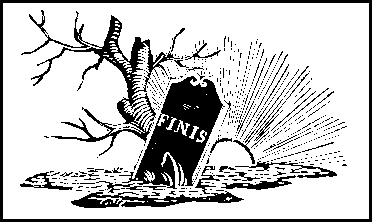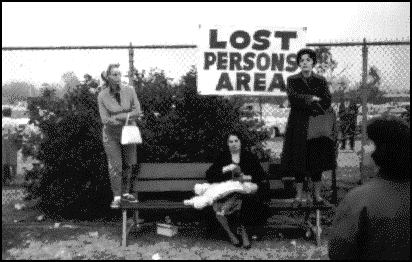McGs.
The Best Obituaries
From Legendary
New York Times Writer
Robert McG. Thomas Jr.
Chris Calhoun, Editor
(Scribner)

It is apparent from a close reading that they are not obituaries at all, but, instead, fantasy pieces. We are guessing that they were somehow put over on the editors of that august institution because no one bothered to check Thomas' astounding and mostly unbelievable facts. Such as,
- In the obit for Marshall Berger, a "dialectologist," it is claimed that 33rd Street becomes "Toidy-toid Street" in Brooklyn because of the influence of the accents of upper class Southern ladies from New Orleans and Charleston;
- That the "memoirist" Philip O'Connor once jumped out from behind a door and shouted "Boo!" at T. S. Eliot;
- That duckpins, a ridiculous faux bowling game originating in Baltimore, could not be listed as the Maryland state game because the state's official sport is jousting;
- That Emil Sitka of Three Stooges fame (he was the straight man) named his two daughters "Eelonka" and "Little-Star" and his four sons "Rudigor," "Storm," "Darrow," and "Saxon." (Next they'll tell us that Saxon moved to the Angles area of England, to be called Anglo-Saxon);
- That Howard C. Fox created the zoot suit, complete with "reet pleat, the reave sleeve, the ripe stripe, the stuff cuff, and the drape shape;"
- That Thomas himself --- according to an obituary written by Michael T. Kaufman --- had a tendency, in his newspaper writing, "to carry things like sentences, paragraphs, ideas and enthusiasms further than at least some editors preferred." He responded,
Of course I go too far...But unless you go too far how are you ever going to find out how far you can go?
Like the mythic Deepthroat, someday the name of the real author of 52 McGs. will be revealed to us. Until that day, let us enjoy these funny and felicitous excursions into the literature of the newly passed over as fantasy, pure and simple.

Report
Philip K. Dick
(Pantheon)
This edition gives us the original 1956 short story in a gussied-up format, designed to look like a space-secretary's notebook --- the pages to be flipped up rather than over. And since the story was short, to fill the 103 pages we get large type (a blessing for us aged reviewers), but, because it is a futuristic nature of the tale, there are design tics, including largely illegible chapter headings, and equally mystifying CIP data. The layout stunts have been better left on the cutting-board or in the computer trash pile by designer Chip Kidd.
The story is well-known: by wiring up three "gibbering, fumbling creatures ... deformed and retarded," to a computer, John Anderton has invented a way to discover crimes before they happen. One day, his own name pops out of the machine as a would-be murderer --- and he's on the run.
Probability rears its ugly head: what if just one of the three idiots had decided that he was not going to be guilty? While he is running around a futuristic New York City, bedeviled by the Army cops, we all get bedeviled by complicated discussions on logic and probability, the theory of "multiple-futures," with time-paths and possibilities of altering that which is to come.
It quite scorched my mind, but I suppose, in 1956 there was more leisure time for readers to diddle with such android philosophies. In any event, it is --- like all Philip Dick stories --- bleak and metallic. It is also loaded with paranoia, as was its author. Anderton --- note the hint of the android in his name --- is never sure if his wife and/or his successor and/or the military and/or the entire government are in on the plot to get rid of him with his invention of the pre-cogs. Nor are we.
Never
Sleeps
Living at Home
With Alzheimer's
Mary Summer Rain
(Hampton Roads)

Because of her deteriorating condition, her daughter Sally decided to move Mary Belle from her place in Kansas City to a small mountain cabin in Colorado to live with her and her best friend, Mary Summer Rain.
Sometimes she would stand in front of the television and pee on the floor, and one day they found her washing her wall clock in the bathroom sink.
When she talked on the telephone to the rest of the family, she claimed that the two women were starving her, stealing from her, being cruel to her. This naturally, created no small strain between the siblings.
In earlier days, Mary Belle had been a good mother and a lively, polite, and warm-hearted lady. Now, she reacted to her carefully prepared meals with "You expect me to eat this slop."
Sometimes, in the mornings, Mary Belle would get up to go to work at her job in the shoe factory:
"Mother, what are you doing?"
"I'm going to work! Those people are picking me up. They're waiting out there for me."
"No, mother, you don't have a job. You're retired, remember? Nobody's out there waiting to take you to any job."
Then Mary Belle would become sarcastic. "You dummy, you slob, a lot you know. Now open this door!"
Sigh. "Mother, it's three in the morning. All the shoe factories are closed now."
Suddenly the gate would be given another hard kick.
"Mother! You're tearing my house apart. Stop it! Stop trying to break things!"
"Well, smarty slut, you won't let me out to go to work! What am I supposed to do?..."
"Mary Belle, c'mon," I sighed, while reaching for her arm to guide her away from the gate, "let's get back to bed."
She yanked her arm back so hard and quick that she ended up hitting her hand on the wall. Daggers flew from her eyes to mine. "Now look what you've done, you slut! You hurt my hand! You leave me alone! Slut, that's what you are, nothing but a slob, slut...I need to go home.
"What about work?" I asked.
"I have to go to work first. He's out there waiting for me. Then I'm going home."
Obviously, by this time, Mary Belle is deep in Alzheimer's and the two women --- Mary Rain and Sally --- have taken on a full-time job, one that lasts for three-and-a-half years, one that tries their patience, their souls, their good-will again and again and again.
Why do they do it? Says Mary Rain,
This Alzheimer's condition and the situation of relatives and caregivers being directly involved with it makes for the quintessential circumstance to turn one's spiritual beliefs into those of personally applied corporeal acts of spiritual works in the world --- to manifest their spiritual goodness in a real hands-on manner by way of positive behavioral responses --- and provides the precious opportunity to spiritually grow through the attainment of greater depths of matured wisdom.
And to prove it, we have page after page of their sad story --- three women plunged into screaming, tears, sleeplessness, madmaking confusion, physical violence, brawls, and general day- Why? Because the very first rule of dealing with old folks --- Alzheimer's or no --- is: never take them out of their environment. Mary Belle had lived all her days in Kansas City. She had a full life there, friends and, too, another daughter (who was opposed, perhaps rightly, to her being taken away). Suddenly at this fragile time in her life she is transported 700 miles to the west, up into the mountains, forty miles from any diversions, locked into a three-room cabin with her daughter and an absolute stranger. I'd certainly go bananas in a set-up like that, no matter how saintly my companions. There is another element, and it has to do with logic. Mary Rain and Sally seem to need to emphasize to Mary Belle, repeatedly, that this is her home, that Sally is her daughter, that she is retired, that the dogs have already been fed, that they just ate. It thus becomes the picture of a deranged old lady --- now a child --- faced with two people who are aggressively caught up in western logic, not realizing that this particular 79- Love Never Sleeps is a detailed manual for help for those who have chosen the thankless job of caring for a relative with Alzheimer's. We are given seventeen stages of Classical Clinical Behavioral Symptoms, including "Loss of Cognition," "Delusions," "Demanding and Belligerence" "Wandering," and "Shadowing." The author shows examples of all of these with Mary Belle. Fifteen "Caregiver's Tools" are also listed, including "Knowing Your Meds," "Routine," "Using Activities as Distraction, " "Understanding vs. Expectation," and "Acceptance." In this way, it's a comprehensive self-help manual for those who have chosen to be caretaker for a loved one. On the other hand, Love Never Sleeps makes an astoundingly strong case for those who, for their own mental health, might decide to turn the care of a family member with Alzheimer's over to professionals. The miracle is that Mary Summer Rain and her friend Sally were able to survive the kind of twenty-four hour attack on their sensibilities that such caregiving represents. The book thus sends a dual message: it's a testament to those who opt to test their sainthood, and it's a powerful raison d'être for those who decide otherwise.